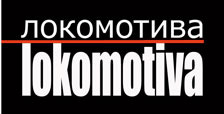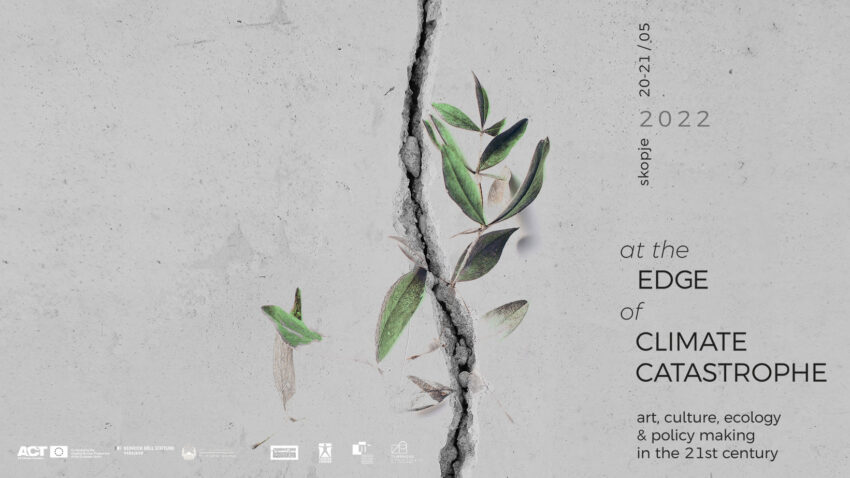
At the edge of climate catastrophe:
Art, culture, ecology and policy making in the 21st century
Conference/ May 20-21, 2022
@ Museum of Contemporary Art – Skopje
“Culture is an important part of humanity. Development agencies, religious leaders, and academic institutions are increasingly recognising its central role in the political, economic and social life of communities. A focus on culture is important to environmentalists as well as to traditional communities. Too often, when we talk about conservation, we don’t think about culture. But we human beings have evolved in the environment in which we find ourselves. For every one of us, wherever we were, the environment shaped us: it shaped our values; it shaped our bodies; it shaped our religion. It really defined who we are and how we see ourselves.”
Wangari Maathai: The Cracked Mirror, Resurgence Magazine, November 11, 2004
This conference was conceptualized as a platform that brings together theoreticians and practitioners of various kinds to share and discuss knowledge about the possible ways of transforming the future into a livable one, for both humans and non-humans (in an ecofeminist, post-colonial framework of care, solidarity and anticapitalism). The conference is part of the activity “Other Spaces”, from the EU project “ACT – Art, Climate, Transition”, which consists of lectures, discussions, artistic research, discursive programmes and other formats. Through them, we try to open up spaces for reflecting, questioning and mapping the role and responsibility of culture and art in our society and their political action; including their relation to issues of extractivism, erosion/appropriation and preservation/development of the commons and the environmental catastrophe.
Two years ago we developed the programme #ArchiveOfReflections, where a variety of theoreticians and practitioners (mostly from the fields of art and culture, as well as other humanities) shared their prospects on the future, while identifying the potentials of establishing new systems of relationships in our society/ies and how our shared practices of self-organization, critical thinking and restored public discourse about the commons can assist those common struggles.
Our intention last year was to map and open relations among critical theory and particular socio-political disciplines, art and culture, media discourse; particularly that of politically active communities outside the formal institutions or those that create new institutions and political realities. This year, Lokomotiva resumed the course together with Freedom Square – Skopje and with Zajedničko – Belgrade. Through this co-imaginative partnership we felt a strong need to turn to grassroot organizing, queer feminist practices and disenfrenchised communities’ cultures as a source of wisdom/knowledge for (trans-national) institutional and political action in the face of the climate catastrophe and the economic and social injustices it causes. Thus, we are opening to our region and the world to learn how certain mobilisations are transforming into policy-making entities and transforming policy-making itself, to understand how institutional, but also many marginal (sometimes even subcultural) praxis and skills, generally coming from disenfranchised communities, are often (empirically!) beneficial for the generative future we are working on. Even in our region we see this reflected in the mass movements for protection of waters, primarily run by rural women.
Our very local context though, i.e. North Macedonia as a nation state, has been perpetuating a state of constant struggle for membership and emulation of “North-Atlantic” and EU integration, but keeps emanating personal/collective politics, communal tactics and subcultures that actually share specifics with counterparts from the Global South. Art and culture are deeply marginalized in our society and haven’t been considered as a resource and as a potentiality that moves and deconstructs diverse paradigms and shifts the public sphere.
With the conference discourse, we aim to refresh our perspectives once again, and to create and produce space for generation of knowledge that stems from diverse practices and fields, one that can be co-inspired and that can acquire more about institutional imagination/innovation, labour, precarity, care and institutions of care, remodeling economic relations and ultimately – systemic transformation – as forms of action that oppose trends which depoliticise the questions of ecology and our responsibility in relation to it. Such are all invited and confirmed participants and contributors: with their thought and work, they generate new perspectives and transgress conventional boundaries in the understanding of what community, self-organization and participation are, thus contributing to transformed personal and collective politics in order to prevent, or at least mitigate the socio-economic injustices resulting from the climate catastrophe.
From reshaping policy-making, to institutional innovation and using “marginal” knowledge, we ask questions:
about the position and potentials of art and culture amid those processes,
about just green transition and the labour of care as a new source of green jobs,
about past and future forms of community organisation and mobilisation,
about institutional imagination and creation of institutions of care,
about the possibility to expand education and story-telling, so that it breeds attachment to the living and nonliving world,
about leisure, togetherness, interdependency, conviviality and friendship,
about the European colonial narrative, its extractivist heritage and the urgency of transformation.
Together, we also oppose the apolitical discourse on sustainable development and solely personal-politics change as a manifestation of a wider process of reducing the politics of the future to only seeking commodifying technocratic solutions, rather than seeking alternative visions with an intersectional perspective which challenge the dominant structures and systems causing hell on earth.
These two days of connecting broad perspectives with specific, localised possibilities are just the beginning of the conversation and create the foundation for further generation of alternative visions and practices enabling those visions.
“Cultural revival might be the only thing that stands between the conservation or destruction of the environment, the only way to perpetuate the knowledge and wisdom inherited from the past, necessary for the survival of future generations.”
Wangari Maathai: The Cracked Mirror, Resurgence Magazine, November 11, 2004
Biljana and Ivana, Conference Curators
Check out the photo album above.
May 20, 2022 – Friday
Opening
10:00 am-10:30 am – Arrival of guests and welcome speech by Biljana Tanurovska-Kjulavkovski and Ivana Dragšić, Conference Curators
10:30 am – 12:30 pm Discussion: Transformation of Policy Making Approaches in the Age of Environmental Catastrophe
– Activities, actions and movements transforming today’s policies and establishing a new, green political framework;
– Green agenda report and how it shapes policy making for the future;
– How can cultural policy reflect the need for transformative action and strengthen the arts and cultural community, to mobilize climate action at scale;
– Breeding public capacities to detect marginal cultural activities as potential policy-making knowledge resources.
Speakers:
- Ljubica Slavković, Architect, CZKD/Nova planska praksa/New Planning Practice – Belgrade
- Ana Méndez de Andés, Architect and Urban Planner, European Municipalist Network, Madrid
- Filip Stojanovski, Senior Researcher, Climate Change Mitigation and Air Quality, Gevgelija
- Tomislav Vukoja, member of Zagreb je naš / Možemo political platform, Zagreb
Moderator: Irena Cvetkovic, Coalition MARGINS, Skopje
12:45 pm – 2:15 pm Presentations and discussion/ Institutions in Culture and Ecopolitics
The logic of interdependence and care as well-being of communities is considered as a commons, a resource and a social duty (G. Giuliani) and can be inscribed to the institutions of culture. Moreover, these institutions today are considered “fictional entities”, to be imagined and reimagined, hence the question: how can we re-imagine the institutions of culture in relation to environmental catastrophe. Having in mind that institutions are a result of encounters and negotiations, as well as intersection between diverse discourses and subjects, we can ask the question – how are institutions in culture shaped through intersection with politics and crises, or how green agendas, global political impacts and a global environmental catastrophe influence the reshaping of cultural institutions and their programmes.
Speakers:
- Zoran Erić, Independent Curator, Belgrade
- Raluca Voinea, Co-Director of tranzit.ro Association and Founding Member of the Experimental Station for Research on Art and Life, Bucharest
- Аna Frangovska, Curator, National Gallery of the Republic of North Macedonia and lecturer at the Institute for Art History and Archeology, Faculty of Philosophy, Skopje
Moderator: Biljana Tanurovska-Kjulavkovski, Curator and Producer, Lokomotiva, Skopje
3:30 pm – 5:00 pm Presentations and discussion/ Feminist Alliances for the Future
Collective frontline decision-making at the grassroots is an essential but overlooked condition for democracy. Involving communities in a participatory conversation, through artistic perspectives of urban and rural activation at the intersection with ecological issues is a feminist principle and just one of the generative examples our devastated planet is a home of. What are the new modes and principles of collective action that work for the living world? Why do they seem to work in different corners of the world? Can we systematize knowledge/make policy/create institutions based on these principles?
Speakers:
- Iva Marković, Activist and Organizer at Right to Water Initiative, Programme Director at Organization for Political Ecology – Polekol, co-Founder of Women for Environment Network (Serbia), Belgrade
- Aslıhan Demirtaş, Architect, KHORA Office, Istanbul
- Giulia Casalini, Curator-Artist-Researcher, based in London, working transnationally
Moderator: Ivana Dragšić, Sociologist, Freedom Square, Skopje
5:30 pm – 6:00 pm The Labour of Panic, Film by BADco
6:15 pm – 7:15 pm Nature Unveiled or Stories about Plants and Workers, performance by Vladimir Bjeličić
May 21, 2022 – Saturday
10:30 am – 11:30 am Lecture and discussion/ A Conversation on Degrowth – New Vision for a Sustainable Future
Climate change has become a reality and its consequences are already being felt, while the concentration of carbon dioxide in the atmosphere is approaching the point of collapse. The gap between the rich and the poor is greater than ever, as we face the sixth global extinction of biodiversity. We have touched the limits of global capitalist growth and we are looking into an open abyss. Rethinking and rejecting the idea of exponential material growth based on profit and considering social and economic alternatives is at the core of the degrowth theory and movement.
Speaker: Predrag Momčilović, Researcher and Journalist, Platform Zajedničko – Belgrade
Moderator: Zdravko Saveski, Initiative for Prohibition of Plastic Bags, Skopje
11:30 am – 1:00 pm Presentations and discussion/ Art Practices and Ecopolitical Perspectives
In our societies (European, Western) artists have the possibility to claim resources, spaces and to critically reflect and relate their concepts to socially relevant issues through their artworks. They are mostly free to raise attention, to question and share questions with larger audiences, to communicate and mediate, mobilise, instigate – unless they are not instrumentalised for the benefit of political and financial elites. How art and artists maintain their path of creation in the context of imminent social and economic injustices; and, also, are they becoming an agency of resilience and change in society.
Speakers:
- Carolina Marques, ArtCultureTransition project, Culturgest, Lisabon
- Vasileios Ntouros, PhD Researcher and Theodora Zoumba, Choreographer, Dancer and Dance Teacher, Reforesting project, Athens
- Krista Burāne, Theatre Director, “The End of the World and Other Nonsense”, Riga
Moderator: Marijana Cvetković, Producer and Curator, Station/Zajedničko Belgrade
2:30 pm – 4:00 pm Presentations and discussion/ Art Education and Ecology, Research, Visions, Encounters…
The extent of sensitisation of art and culture education to the environmental and, above all, critical historical time that we live and work (and create) in is of immense importance today. Does the art/culture education curriculum recognise, and if so, how is it (re)shaped by the social/economic injustices caused by the climate catastrophe? How should we respond to those changes, imagine, create and develop not only green artistic/cultural practices; but embed the urgency for transformative culture and politics in the public education outlets?
Speakers:
- Nikolina Pristaš, Choreographer, Assistant Professor at the Dance Department of the Academy of Dramatic Arts in Zagreb;
- PhD Jovana Karaulić, Assistant Professor FDA / Co-Founder Green Art Incubator
- Sabine Zahn, Floating University, Berlin
- Slobodanka Stevcheska, Faculty of Fine Arts, Skopje
Moderator: Violeta Kachakova, Cultural Manager, Researcher and Producer
4:15 pm – 5:00 pm Lecture and discussion/ A Transformative Doughnut Model for a More Sustainable and Just Society
The doughnut model is increasingly emerging as an alternative measure of human development, meeting needs and crossing the boundaries of environmental degradation. Over the past ten years, the model has been further developed, and more and more cities are giving up measuring their development only through GDP and are deciding to switch to the doughnut model, which should ensure that human needs are met in accordance with natural boundaries. The doughnut model stems from the need to maintain humanity on a global, regional and local level within the limits of sustainability, and to measure the satisfaction of social needs such as housing, education, social justice, democracy, etc. In order to create a different society, we also need new tools that will not reduce progress exclusively to GDP growth.
Speaker: Miloš Kovačević, Researcher, Belgrade
Moderator: Ivana Dragšić, Sociologist, Freedom Square – Skopje
*****
The conference is organized by Lokomotiva – Centre for New Initiatives in Arts and Culture and Freedom Square;
Partners: Platform Zajedničko – Belgrade and Museum of Contemporary Arts – Skopje.
Supported by: The Creative Europe programme of the EU, Ministry of Culture of the Republic of North Macedonia and Heinrich-Böll-Stiftung e.V. (Heinrich Böll Foundation).
Conference Team:
Biljana Tanurovska-Kjulavkovski and Ivana Dragšić (Curators), Blagica Petrova (Project and Financial Manager, Lokomotiva), Zorica Zafirovska (Programme Coordinator, Lokomotiva), Gjurgjica Hristovska (Administration, Lokomotiva), Jana Acevska (Design), Ana Knezhevikj (PR and Assistant Coordination), Kristijan Karadzhovski (Video and Photo Documentation).
#conversations, #ecofeminism, #act, #environmentalawareness, #deconstructing, #artclimatetransition, #otherspaces, #LokomotivaSkopje
__________________________________________________________________________________________
__________________________________________________________________________________________

__________________________________________________________________________________________


